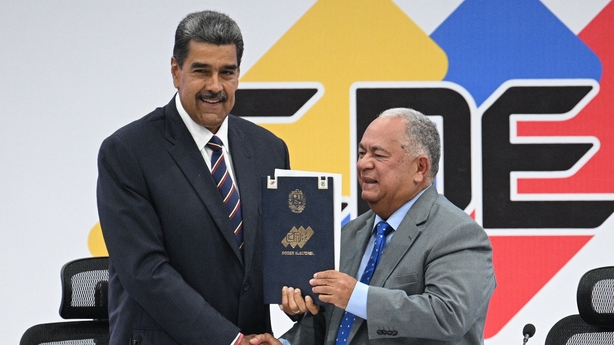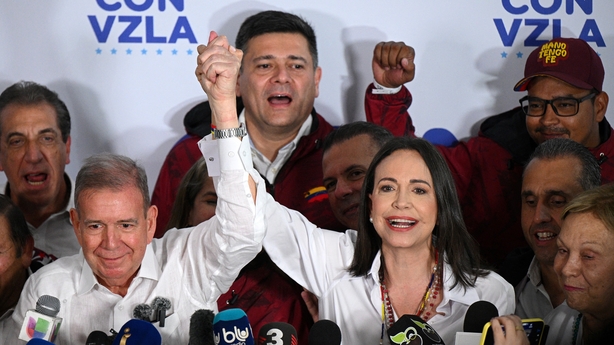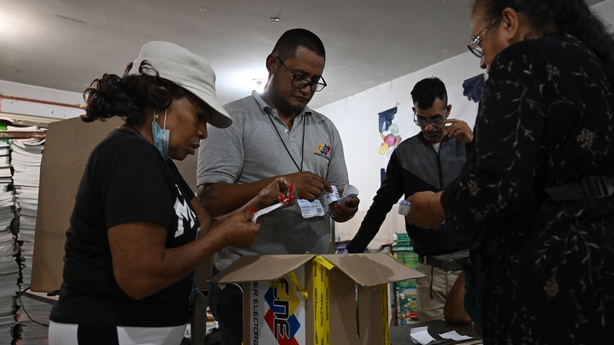Protests erupted in parts of Caracas against the re-election victory claimed by Venezuelan President Nicolas Maduro but disputed by the opposition and questioned internationally.
After an inordinately quiet morning in the capital, with people saying they were still in shock, protesters started flooding the streets of several neighborhoods around lunchtime, while Maduro's disputed victory was being certified by the loyalist CNE electoral authority.
Dozens soon turned to hundreds as more and more joined demonstrations despite rain and police being deployed in large numbers.
Security forces have also deployed tear gas to disperse the anti-Maduro protesters.
In one neighborhood, Petare, residents chanted: "It's going to fall, it's going to fall, this government is going to fall!"
"Freedom, freedom!" shouted others, burning Maduro campaign banners.
In the morning, residents were heard banging pots and pans in a show of dissatisfaction.
UN calls for transparency
Earlier, UN Secretary-General Antonio Guterres called for Venezuelan election authorities to be fully transparent with the country's presidential vote, as Nicolas Maduro was declared victorious despite opposition complaints of irregularities.
"The Secretary-General calls for complete transparency and encourages the timely publication of the election results and a breakdown by polling stations," spokesman Stephane Dujarric said.
He also called for disputes to be "resolved peacefully" and for "moderation" by Venezuelan political leaders and their supporters.
US Secretary of State Anthony Blinken said the US has "serious concerns" that the Venezuelan election result declaring President Nicolas Maduro the winner is not accurate.
"We have serious concerns that the result announced does not reflect the will or the votes of the Venezuelan people," Mr Blinken said.
Shortly before he spoke, Venezuela's electoral council had announced that Maduro won re-election to a third six-year term with 51.2% of votes cast.

Both candidates claim victory
Mr Maduro and his opposition rival Edmundo Gonzalez are both claiming victory, after a vote marked by accusations of underhand tactics and isolated incidents of violence.
The country's electoral authority said that Mr Maduro had won a third term with 51% of the vote, despite multiple exit polls which pointed to an opposition win.
The authority said opposition candidate Mr Gonzalez won 44% of the vote, though the opposition had earlier said it had "reasons to celebrate" and asked supporters to continue monitoring vote counts.
Mr Maduro, appearing at the presidential palace before cheering supporters, said his reelection is a triumph of peace and stability and reiterated his campaign trail assertion that Venezuela's electoral system is transparent.

Fireworks sounded over the capital, Caracas, as lighted drones formed a brightly-colored image of Mr Maduro in the sky above the presidential palace.
Opposition leader Maria Corina Machado said Mr Gonzalez had won 70% of the vote and that multiple independent exit polls and quick counts decisively showed his victory.
"Venezuela has a new president-elect and it is Edmundo Gonzalez. We won and the whole world knows it," she said in a joint statement with Mr Gonzalez.
Mr Gonzalez said he was not calling for supporters to take to the streets or commit any acts of violence.
Read more: Leaders across Americas react to Venezuela election results
A poll from Edison Research, known for its polling of US elections, had predicted in an exit poll that Mr Gonzalez would win 65% of the vote, while Maduro would win 31%.
Local firm Meganalisis predicted a 65% vote for Gonzalez and just under 14% for Mr Maduro.
About 80% of ballot boxes have been counted, said national electoral council (CNE) president Elvis Amoroso in a televised statement, adding results had been delayed because of an "aggression" against the electoral data transmission system.
The CNE has asked the attorney general to investigate the "terrorist actions", Mr Amoroso said, adding participation was 59%.
The CNE is meant to be an independent body, but the opposition alleges its acts as an arm of the government.
The top opposition official meant to witness the overall national count was not allowed to and there were several polling stations where opposition observers were not allowed to observe, the opposition said last night.
Earlier, Ms Machado reiterated a call for the country's military to uphold the results of the vote. The opposition says it has copies of about 40% of voting records.
"A message for the military. The people of Venezuela have spoken: they don't want Maduro," she said earlier on X.
"It is time to put yourselves on the right side of history. You have a chance and it's now," she said.
Venezuela's military has always supported Mr Maduro, a 61-year-old former bus driver and foreign minister, and there have been no public signs that leaders of the armed forces are breaking from the government.

Ms Machado has been the star of the coalition campaign, despite a ban on her holding public office that forced her to pass the torch to Mr Gonzalez, a 74-year-old former diplomat known for his calm demeanour.
Mr Gonzalez won backing even from some former supporters of the ruling party, but the opposition and observers raised questions ahead of the vote as to whether it would be fair, saying decisions by electoral authorities and the arrests of opposition staff were meant to create obstacles.
Mr Maduro, whose 2018 reelection is considered fraudulent by the United States, among others, had warned last week of a "bloodbath" if he were to lose.
President Maduro's government has presided over an economic collapse, the migration of about a third of the population, and a sharp deterioration in diplomatic relations, crowned by sanctions imposed by the United States, the European Union and others which have crippled an already struggling oil industry.
Mr Maduro said if returned to power he would guarantee peace and economic growth, making Venezuela less dependent on oil income.
Mr Maduro also said he would decree a national dialogue, using a term that typically means conversations between the government and opposition, businesses, communities and others.
Many of his supporters speak enthusiastically of his mentor Chavez, and see Mr Maduro, in power since Chavez's death in 2013, as a continuation of Chavez's legacy of helping the poor.

